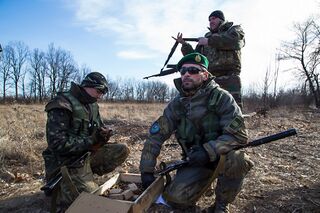3280 Confederate coup d'état
| 3280 Confederate coup d'état Operation Rejuvenation | |||||||
|---|---|---|---|---|---|---|---|
  Top: Odera Capital Establishment in ruins as rebel forces storm Capitol tower. Bottom: Confederate rebels arm themselves in preparation for an attack. | |||||||
| |||||||
| Belligerents | |||||||
|
| Confederate Rejuvenation Front | ||||||
| Commanders and leaders | |||||||
| Lord Minister Logan Jackson | Field Marshal Henry Julith | ||||||
| Units involved | |||||||
|
CRS Odera CRS Rapid Destruction CRS Swift Interception CRS Jackson Samely Eight Samster-class frigates |
CRS Hammer Brought Forth CRS Intrepid Seduction CRS Vast Remission | ||||||
| Strength | |||||||
|
Total of 1.92 million personnel deployed
|
Total of 720,288 personnel
| ||||||
| Casualties and losses | |||||||
|
112,159 killed 233,229 wounded 1 dreadnought destroyed 2 cruisers destroyed |
100,922 killed 192,691 wounded 1 cruiser heavily damaged 1 destroyer destroyed | ||||||
| Around 220,000 - 360,220 civilians were killed or wounded | |||||||
The 3280 Confederate coup d'etat was an attempted coup by a faction within the Oderran Confederation, known as the Confederation Rejuvenation Front in the hope of overthrowing the government, reorganise the nation into a military junta and reclaim the initiative against the winning Milky Way Alliance in the Great Intergalactic War. The coup was led by the then Commander of the Confederate Terrestrial Forces, Field Marshal Henry Julith. The coup was partly successful, with the CRF taking hold of one of the three major Confederation homeworlds, Janith, but the CRF was defeated by forces still loyal to the government in other areas, including the capital of the Confederation, Odera. The coup finally ended on 29 October.
Over 600,000 combatants of all sides were killed or wounded during the coup, while figures range from 220,000 to 360,220 civilians killed or wounded. The planets of Janith, New Longshore and Odera were devastated by the coup, with several cities across these planets suffering massive damage from aerial bombardments, ground fighting and orbital artillery strikes. The governmental buildings on Odera were one of the main targets of the coup and suffered extensive damage from the fighting; the personal residence of the Lord Minister of the Confederation, the Ministerial Palace, was almost reduced to rubble while the Confederate Parliament building was severely damaged by several airstrikes. The effects of the coup were far reaching and wide: almost immediately after the coup began, martial was declared across the Confederation and Lord Minister Logan Jackson was given emergency powers. He immediately dissolved the parliament and ordered any resistance against the government to be suppressed, resulting in hundreds of arrests and executions. The coup split apart an already divided nation and further weakened the Confederation's resolve to continue the war against the Milky Way Alliance and used up valuable materiel for the war effort and also diverted manpower. Right after the end of the coup, the Concordium initiated the final major push against the exhausted Confederate defenders in the 3280 Halloween Offensive and the Confederation surrendered nearly a year later, on October 8th.
Background
Milky War Conflict
The main reason for the coup is often cited to be the failures of the Confederation against the Milky Way Alliance during the Milky Way Conflict. The Confederation had been fighting for a devastating war for 29 years that had seen no major Confederate successes in that time. Most of the Oderran populace had become disillusioned with the war, but few knew the actual severity and scale of the Confederation's failures due to propaganda and censorship by the Confederate government. By 3280, the Confederation was outnumbered 10:1 in terms of manpower and materiel and most MWA commanders determined the Confederation would surrender in, at most, 2 years. Losses had plagued the Confederation as they sustained the destruction of thousands of starships and trillions of casualties from 29 years of constant fighting. Much of the Confederate military leadership themselves had been disillusioned with the prospect of winning the war, while others harboured increasing disadin towards the political leadership, believing they had become inept at overseeing the nation through the war.
Field Marshal Henry Julith was a firm of believer of the latter; he was supreme commander of Confederate terrestial forces and had become extremely disenchanted towards the government and especially its leader, Lord Minister Logan Jackson. The Confederate military had sustained innumerable defeats and hopes for victory had dwindled in the chief command staff. Julith surmised that the current government was to blame for the disastrous losses the Confederate military had sustained and he was especially frustrated at the Oderran Navy, which had not won a single battle since 3572, during the Battle of Octavius Prime. This was further compounded by the fact that the Oderran navy held the a dominant influence within the Confederate government, relegating the terrestial forces to neglect. While Julith consistently voiced his concerns and frustration at how the war was being fought, the civilian leadership were often unconvinced and neglectful.